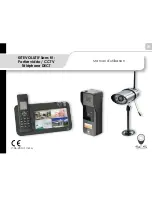
8
ICP-2000 Description
The ICP-2000 is a 1RU breakout panel that converts
the SCSI type II connection provided from the TM-
2000/MTM-2000 communication card(s) into 9-pin D-
Sub connections. Each RS-485 communication card
on the TM-2000/MTM-2000 has 8 ports provided on
the SCSI type II connector. The ICP-2000 breaks
these 8 ports into individual 9-pin D-Sub connections.
There are two SCSI type II connectors on the ICP-
2000. These two connectors allow both a primary and
redundant TM-2000/MTM-2000 to be connected. The
connectors are wired in parallel, so it does not matter
which connector the primary TM-2000/MTM-2000 and
(if present) redundant TM-2000/MTM-2000 are
plugged into. The ICP-2000’s connectors are labeled
from left to right J1, J2, J3....J8. These will correspond
from low number to high number of ports associated
with the cable plugged into the ICP-2000. For ex-
ample: If the cable plugged into an ICP-2000 with ports
1-8 on it, then J1 would be port 1, J2 port 2, up to J8
being port 8. If the cable plugged into an ICP-2000
with ports 9-16 on it, then J1 would be port 9, J2 port
10, up to J8 being port 16. It is important to note that
in systems using VDP panels, port 1 is reserved for
connection to the VDP controller and should not be
connected to an ADAM or ADAM CS.
Front Panel Features
1.
9-pin female D-sub connector. Each connector is
dedicated to an RS-485 communications port
carried on the SCSI type II cable from the TM-
2000/MTM-2000.
Rear Panel Features
1.
SCSI type II connectors. These are wired in
parallel, so it does not matter which connector is
used with a TM-2000/MTM-2000 even in redun-
dant systems. The SCSI type II cables are
included with the TM-2000/MTM-2000 or with an
add-on RS-485 port card for the TM-2000/MTM-
SWP-2000 Description
The SWP-2000 is a 1RU switch over panel that
provides common connections for TrunkEdit and
TrunkSupervisor software packages (via serial
connections to a Windows
®
based PC), status moni-
toring of both TM-2000/MTM-2000 units and control
of both TM-2000/MTM-2000 units when used in a
redundant configuration.
Front Panel Features
1.
Power LED. Indicates that the SWP-2000 has
power.
2.
TM/MTM A Status LEDs. Indications for: Activity,
Active TM/MTM, Standby TM/MTM, Other TM/
MTM. The Activity LED indicates activity on the
TM-2000/MTM2000 associated with the TM/MTM
A inputs. Active TM/MTM LED indicates with TM-
2000/MTM-2000 (either A or B) is active.
Standby TM/MTM LED indicates which TM-2000/
MTM-2000 (either A or B) is in standby. Other
TM/MTM LED indicates green if TM/MTM B is
talking, red if not, and off if the system is not
configured for a backup TM-2000/MTM-2000.
3.
TM/MTM A Go Active control switch. Forces the
TM-2000/MTM-2000 associated with the TM A
inputs to become the active trunk master.
4.
TM/MTM B Status LEDs. Indications for: Activity,
Active TM/MTM, Standby TM/MTM, Other TM/
MTM. The Activity LED indicates activity on the
TM-2000/MTM-2000 associated with the TM/
MTM B inputs. Active TM/MTM LED indicates
which TM-2000/MTM-2000 (either A or B) is
active. Standby TM/MTM LED indicates which
TM-2000/MTM-2000 (either A or B) is in standby.
Other TM/MTM LED indicates green if TM/MTM A
is talking, red if not, and off if the system is not
configured for a backup TM-2000/MTM-2000.
5.
TM/MTM B Go Active control switch. Forces the
TM-2000/MTM-2000 associated with the TM/
MTM B inputs to become the active trunk master.
Rear Panel Features
J1
J2
J3
J4
J5
J6
J7
J8
TELEX COMMUNICATIONS, INC.
MADE IN USA
TM
ICP-2000
1
1
TM
SWP-2000
Activity
Active TM
Standby TM
Other TM
Go Active
TM A
Activity
Active TM
Standby TM
Other TM
Go Active
TM B
Power
1
2
3
4
5
TM A INPUT
PP
TRK EDIT
TRK SPVR
TM B INPUT
PP
TRK EDIT
TRK EDIT
TRK SPVR
TRK SPVR
OUTPUT
100-240 VAC
1
2
3
4
5
6
7
8
9
Figure 3. ICP-2000 front panel features
Figure 4. ICP-2000 rear panel features.
Figure 5. SWP-2000 front panel features
Figure 6. SWP-2000 rear panel features.
Summary of Contents for ICP-2000
Page 2: ...2 This page intentionally left blank ...
Page 4: ...4 This page intentionally left blank ...
Page 6: ...6 This page intentionally left blank ...
Page 15: ...15 Figure 10 Example of a non redundant TM 2000 system ...
Page 16: ...16 Figure 11 Example of a redundant TM 2000 system ...
Page 22: ......








































